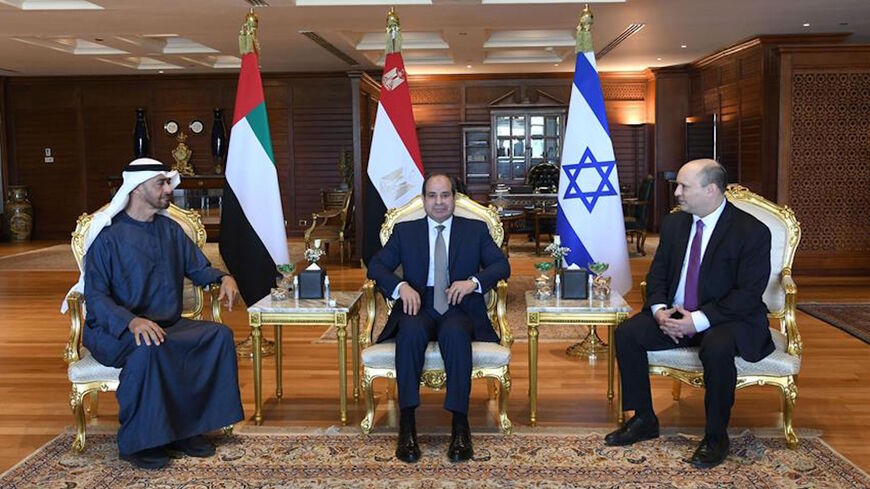Hot take: Bennett heads to Egypt as Iran talks wrap up in Vienna
Bennett boosts profile as mediator. Israeli Prime Minister Naftali Bennett met Tuesday in the Red Sea resort city of Sharm el-Sheikh for a trilateral summit with Egyptian President Abdel Fattah al-Sisi and Emirati Crown Prince Mohammed bin Zayed, just weeks after his surprise visit to Moscow to help mediate Russia’s war on Ukraine (as we reported here). While the crisis in Ukraine was among the topics discussed, anger from the Gulf over US efforts to revive the 2015 nuclear deal dominated the agenda. Though Saudi officials weren’t physically present in Sharm el-Sheikh, “their views were well represented, with their anger and fear over the imminent deal with Iran echoing Israel’s,” scoops Ben Caspit in his article on the summit.
‘Tremendous anger’ at IRGC delisting. Recent reports that Washington may remove the Islamic Revolutionary Guard Corps (IRGC) from its list of terrorist organizations as part of a renewed deal “have caused tremendous anger in many Middle Eastern capitals, especially in Saudi Arabia and the Emirates,” writes Caspit. Bennett and Israeli Foreign Minister Yair Lapid went as far as to issue a joint statement on the topic on March 19, saying, "We refuse to believe that the United States would remove [the IRGC’s] designation as a terrorist organization.”
Is terror designation a ‘false issue’? In an interview for Al-Monitor’s “On the Middle East” podcast last week, Mark Fitzpatrick, an associate fellow at the International Institute for Strategic Studies, recalls that former President Donald Trump applied the Foreign Terrorist Organization designation to the IRGC “in a political context,” whereby he was “trying to put a roadblock to his successor in any effort to restore” the deal. Fitzpatrick calls the designation a “false issue,” since “the deal to restore the JCPOA (Joint Comprehensive Plan of Action) has to lift all sanctions which would impede implementation of the deal.” And the United States has other terrorism- and sanctions-related sanctions on Iran, outside the JCPOA. In addition to its military role, the IRGC has a massive economic footprint and thus would need to be addressed in any effort to revive the deal.
Mixed signals? Just hours after the Bennett-Lapid statement, Israel’s Defense Minister Benny Gantz issued a statement of his own. Gantz, who notably did not sign on to the prime minister’s document, “emphasized the importance of deepening cooperation between the US, Israel and regional partners in the face of ongoing Iranian aggression.”
Having it both ways. The "somewhat contradictory" statement by Gantz did not lead to a "political crisis," according to Caspit, yet it does show that "the Israeli government is trying to play both sides as it contends with the Iran agreement." While Bennett's rhetoric can help appease Emirati and Saudi anger, Gantz meanwhile "concentrates on the day after and Israel's vital security and defense ties with the United States."
From our regional correspondents
1. Zelenskyy’s Holocaust rhetoric troubles Israelis
Ukrainian President Volodymyr Zelenskyy’s use of Holocaust comparisons has drawn condemnation on both sides of Israel’s political aisle. During his March 20 Zoom address to the Knesset, Zelenskyy appeared to equate the horrors of the Russian invasion of his country to the Nazis’ mass annihilation of the Jewish people. Mazal Mualem writes that the Ukrainian president “may have thought that as a Jew himself, he would be forgiven for invoking the most sensitive collective Jewish-Israeli memories,” but his call to action might have had the opposite effect. Rina Bassist has more on Zelenskyy’s address to Israeli lawmakers, including his plea for weapons and sanctions against Russia.
2. Islamic State picks up attacks in Syrian desert
Videos showing the son of a Free Syrian Army commander boasting of his luxurious lifestyle has outraged Syrians living in the country’s impoverished northwest. Khaled al-Khateb explains that the videos, which depict Walid Khweilid surrounded by bodyguards, weapons and expensive cars, are far from the first time Turkey-backed rebel leaders and their children have flaunted their wealth on social media.
Elsewhere in Syria, Sultan al-Kanj reports that the Islamic State is stepping up deadly attacks against Syrian government forces after the naming of the group’s new leader, Abu al-Hassan al-Hashemi.
3. Egypt, Sudan deepen military ties over Nile dam dispute
Egypt and Sudan recently held high-level military talks as tensions mount over Ethiopia’s giant hydroelectric dam. Sudanese military chief Osama Askar’s visit to Cairo last week came as Ethiopia began draining the middle passage of the Grand Ethiopian Renaissance Dam (GERD). Mohamed Saied reports that Addis Ababa’s GERD construction has led to increased military cooperation between its downstream neighbors.
4. Lebanon embraces cryptocurrency as economy tanks
As trust wanes in Lebanon’s central bank and financial institutions, cryptocurrency is in high demand. Rodayna Raydan writes that “Lebanon is bursting with crypto mining shops, traders and online mentors to fulfill the surging demand from people desperately looking to gain financial freedom and much-needed US dollars.” The country’s first bitcoin ATM is now located on Beirut's iconic Hamra Street, and a second machine is reportedly on the way.
5. Jenin’s resistance fighters confront Israel
The Israeli army has recently intensified its raids on the West Bank city of Jenin, which Ahmad Melhem compares to “a fire that Israel is trying to put out, amid fears that it would spread to the rest of the areas in the West Bank.” The Israeli army has been relying on its special units to carry out arrests of alleged terrorists in Jenin, and specifically within the city’s refugee camp. Melhem spoke to Palestinian resistance fighters in Jenin who claimed the Israeli raids are designed to incite them.
Multimedia this week: Zelenskyy’s Israel pitch, Ukraine invasion’s impact on Syria
Listen: Ben Caspit and former Israeli Ambassador to Turkey Alon Liel discuss how Volodymyr Zelenskyy used his Knesset speech to attack Israel’s stance on the war in Ukraine.
Watch: Joe Snell catches you up on the latest Middle East and North Africa headlines in one minute.
Listen: Amberin Zaman interviews Aron Lund, a fellow at The Century Foundation think tank who focuses on Syria, about how Russia's invasion of Ukraine is set to have cascading effects in Syria where the Kremlin has been propping up the government of Syrian President Bashar al-Assad.











